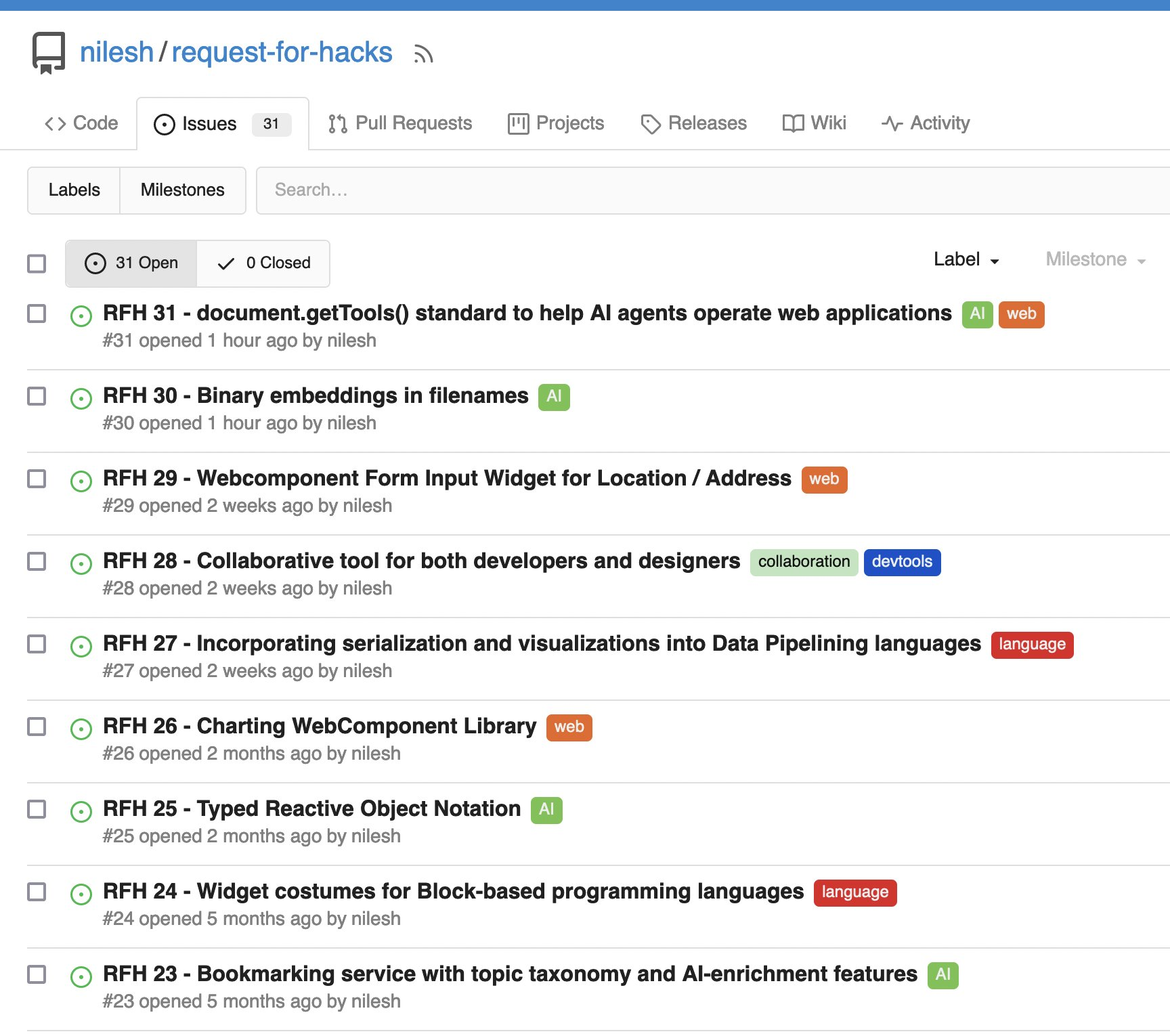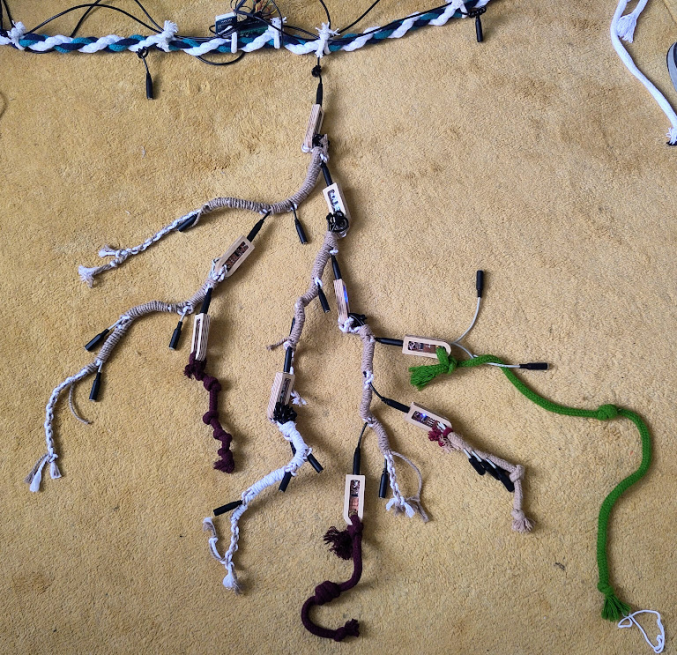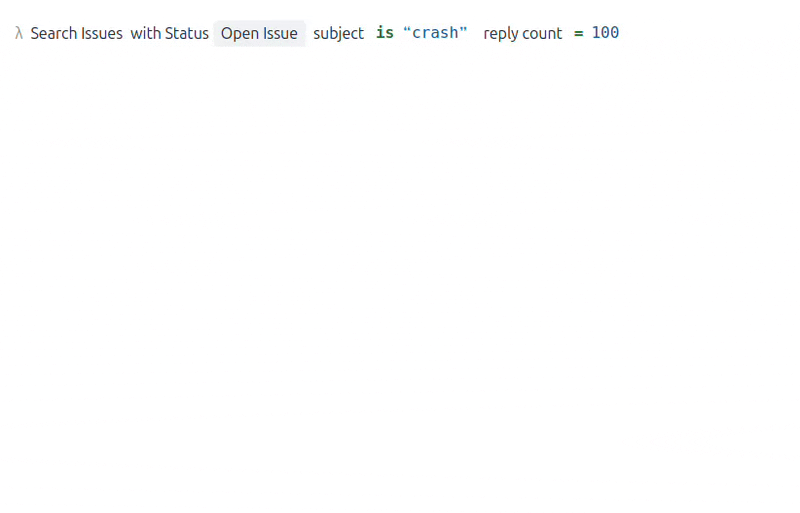🚀 codeflowcanvas.io 🎥 Collective Problem Solving in Music, Science, Art... 🦠 Demon horde sort
Our Work
🚀 codeflowcanvas.io via Maikel van de Lisdonk
🧵 conversation
Yes, the time has finally come! I'll share a link to my visual programming project online! I've been mainly showing some video's on the devlog channel about the project.
Warning upfront: Although I've been working on this for quite some time (I even started from the ground up last year after working on my previous visual programming project for multiple years).. there's still a lot of work to be done and bugs to be fixed. The UI/UX is far from perfect but it is demo-able enough I think. However, it's still just in "demo-stage" and not usable by other projects (I haven't build any npm packages for integrating or vs-code extension for example).
My goal is to make a generic visual programming system (VPS) with which domain or application specific vpl's can be made. For now I am implementing 2 vpl's on top of the current base: a flow-based-programming inspired system and a "visual shader-toy".
Since the tool is an infinite canvas, you can zoom and drag the canvas using mouse/wheel/touchpad. I've spend some time getting touchscreen support, but more work definitely needs to be done there.
When you open up one of the editors, you can use the dropdown in the top-menu to load an example flow.
Without further ado, here's the link: codeflowcanvas.io : there are 2 demo playgrounds in which you can play around.
I'll post some more details in the 🧵.
Thanks for some feedback!
Devlog Together
💬 Kartik Agaram
🧵 conversation
A little thing like an 'edit' button introduces cascading issues:
- LÖVE (in combination with mobile restrictions) won't let me modify code files in place. I have to overlay my changes in a new location.
- But now I can't pick up any upgrades to my app. Upgrades modify code files in place, but any overlay persists (otherwise you'd completely lose your changes after upgrading).
- But hey I have a programmable editor here! I'll just create a new file called 'scratch' with a one-liner to blow away the overlay. (With my app user's hat on, I know in this case my changes are minor in a way that I don't with my app developer's hat on.)
- (A few hours later.) Wait, now none of my changes are having any effect. And they're completely blown away when I go back to the code.
- 🤦 Oh it's that 'scratch' file still hanging around. So it needs to be a 2-liner. I have to make any changes I want to the file system -- and then delete 'scratch' to make this a one-time operation.
- I could try to create a screen of helpers for this, along with a comment that says, "insert file system operations here" after which is a delete of 'scratch'.
In this way I find myself playing meta-Sokoban.. 🙄
Tl;dr - the 'edit' button isn't really usable yet.
I really don't want to go down the road of building a compare and merge flow 🙄
💬 Kartik Agaram
🧵 conversation
Simple shortest-path routing to reduce some of the drudgery in Sokoban. Integrated with undo.
Next up: routing while pushing a single crate without moving any other crates. That feels more complicated than this glorified breadth-first search. In particular, I'm not yet sure how to detect cycles. Moving a crate can involve being in the same place over and over again. I think I need to hash the player's location in combination with the crate's location 🤔
🎥 sokoban empty path
💬 Kartik Agaram
🧵 conversation
My solver can now push a single crate to a destination without moving any other crates. But I feel ambivalent about this. Devlog in 🧵
🎥 sokoban solver
Thinking Together
💬 Stephen De Gabrielle
🧵 conversation
Does a ~parametric IDE~ exist?
I’m not sure if this makes sense, but I’m thinking similar to Parametric CAD tools(&sketchpad), but for code?
Maybe making use of type annotations, contracts, interfaces, etc. at ~edit-time~ (instead waiting for ~compile-time~ or ~run-time~ ).
💬 Kongwei Ying
🧵 conversation
Another concept I've been ideating about is how to bring Literate Programming, by Donald Knuth, into my daily work, which involves modern tools and stacks like VSCode and Node.js. I believe inline, rich text snippets which are integrated with some kind of personal knowledge management system is the way to go. This way, instead of having comments like this:
// TODO: Refactor this to use the revised approach
It instead would look like using Notion or Obsidian inside VSCode. So above a function, would be a small window into a single page that describes a single function. You can do anything here, like linking references that are relevant to the design of the function. Or you could even have a lengthy design document that explains why a function was written a certain way. Going even further, you could have a page which describes the evolution of a function over time, why at the beginning it was written a certain way, why changes had to be made, and why it looks the way it looks right now.
And added bonus of this approach is that now it's possible to have a single source of truth for docs and your code. So rather than maintaining a separate Docusaurus that has to be updated to sync it with evolution in code, you can just maintain documentation in line. And then to publish developer docs online, you merely just take all the little snippets above each function and then aggregate them onto a single page.
Basically, this approach is powerful because instead of 1D strings of text, now you can have the power of rich text in your code. Including diagrams, and even embedding other programs through would be possible. And when your code needs to be compiled, all these rich text snippets are simply removed.
Content
📝 Accessibility Has Failed: Try Generative UI = Individualized UX via Dave Liepmann
🧵 conversation
Jakob Nielsen asserts that accessibility has failed to serve disabled users because of a mistaken focus on standards. This approach is unable to address the wide variety of disabilities, and because it is by definition a derivative of a GUI, it is doomed to provide a second-class experience to e.g. blind users. He points out differing needs by older and less literate users, and proposes generative UI as a promising solution.
I was skeptical of the headline and tweet-length summaries. There has been not-insignificant backlash. The full article leaves me still skeptical but certainly willing to see where the idea of bespoke-to-one's-needs UIs could take us.
🎼 cmajor.dev via Christopher Shank
🧵 conversation
You’ve heard of C, C++, C#, objective-C… well, Cmajor is a C-family language designed specifically for writing DSP signal processing code.
They have a JIT engine, but it also compiles to WASM so it can run on the web. This means old synths can be ported to run on the web!
cmajor.dev/docs/Examples/Pro54
🎥 RubyConf 2019 - Keynote - Collective Problem Solving in Music, Science, Art... by Jessica Kerr via Oleksandr Kryvonos
🧵 conversation

this is a great inspirational talk about sharing ideas
📝 An overdue status update on Darklang via Jeffrey Tao
🧵 conversation
Haven't checked in on Dark in a few years but it seems they're dropped the custom editing environment, among other changes blog.darklang.com/an-overdue-status-update
We've been working hard at Darklang for the past year, but haven't been very vocal about what we've been up to.
Here’s the “Darklang” that’s been live for years:
Darklang – the live version, which we're now calling Darklang classic – is a developer tool composed of a few interconnected
📝 CP 2024 - Choreographic Programming 2024 - PLDI 2024 via Ivan Reese
🧵 conversation
A call for talks for the first ever workshop on Choreographic Programming at PLDI this summer. Deadline next Friday.
Choreographies are coordination plans for concurrent and distributed systems. A choreography defines the roles of the involved participants and how they are supposed to work together. In the emerging paradigm of choreographic programming (CP), choreographies are programs that can be compiled to executable implementations.
CP originated primarily in the context of process calculi, with preliminary work done to establish its foundations and experiment with implementations. Recently, several proposals have shown that one can adapt CP to work in synergy with mainstream programming paradigms ...
📝 ‹Programming› 2024 - Arts - ‹Programming› 2024 via Alex McLean
🧵 conversation
I've only just noticed that there is an arts track at the ongoing conference this year! awesome ‹Programming› 2024 - Arts - ‹Programming› 2024
Step into a world where lines of code dance with strokes of creativity!
At this year’s edition of the Programming conference, we are opening an Arts track to engage with the idea that art can inform computational practices and their presence in the world. With this track we invite participants of the conference to join a series of presentations and meet with the artists. We hope the Arts track will inspire the programming community to propose artistic projects for future editions.
Events include: KhipuKoding, a session with live coding by Paola Torres Nunez del Prado;
Programming a ...
🦠🎥 T2 Matrix Brain Challenge T-2 And Counting - T2sday 3148 via Lu Wilson
🧵 conversation

Update from Dave Ackley (whose essay we talked about on the last episode)
A large part of this video is about some initial work on making the 'demon horde sort' better, which is his proposed robust-first way of doing number sorting
📝 If What We Made Were Real via Christopher Shank
🧵 conversation
“If What We Made Were Real:
Against Imperialism and Cartesianism in Computer Science, and for a discipline that creates real artifacts for real communities, following the faculties of real cognition” by Basman (2020)
🤖
📝 Cognition emerges from stealth to launch AI software engineer Devin via Greg Bylenok
🧵 conversation
Is the future of coding just not coding?
In the SWE-bench test, Devin was able to correctly resolve 13.86% of GitHub issues without any assistance, performing far better than GPT-4.
👨🏽💻 By 🐘 @[email protected] 🐦 @warianoguerra
💬 Not a member yet? Check the Future of Coding Community
✉️ Not subscribed yet? Subscribe to the Newsletter / Archive / RSS
🎙️ Prefer podcasts? check the Future of Coding Podcast
 New little demo of end user software customization by Geoffrey Litt
New little demo of end user software customization by Geoffrey Litt Chet Chorcos shared a full-stack prototype of collaborate web application backed by a Datalog-inspired database he built in one day.
Chet Chorcos shared a full-stack prototype of collaborate web application backed by a Datalog-inspired database he built in one day. Useful resources mentioned in the How does it work? section of the readme.
Useful resources mentioned in the How does it work? section of the readme. A brief walk-through on the steps needed to create launch visualizations from the SpaceX HTTP JSON API (cameo of the basket to ease drag and drop of multiple things in targets far apart from the source). Also short demos about Premier League Attendance and Goals by Team from CSV File and Sales KPIs from an Excel Spreadsheet by Mariano Guerra
A brief walk-through on the steps needed to create launch visualizations from the SpaceX HTTP JSON API (cameo of the basket to ease drag and drop of multiple things in targets far apart from the source). Also short demos about Premier League Attendance and Goals by Team from CSV File and Sales KPIs from an Excel Spreadsheet by Mariano Guerra Beyond Snapping: Persistent, Tweakable Alignment and Distribution with StickyLines
Beyond Snapping: Persistent, Tweakable Alignment and Distribution with StickyLines Beyond Grids: Interactive Graphical Substrates to Structure Digital Layout
Beyond Grids: Interactive Graphical Substrates to Structure Digital Layout Project Lincoln: Adobe MAX 2017 (Sneak Peeks)
Project Lincoln: Adobe MAX 2017 (Sneak Peeks) Data Illustrator: Create infographics and data visualizations without programming
Data Illustrator: Create infographics and data visualizations without programming Charticulator: Create Bespoke Chart Designs without Programming. (
Charticulator: Create Bespoke Chart Designs without Programming. (  Video)
Video) Jennifer Mary Jacobs - Domain Specific Programming Platforms for Creativity
Jennifer Mary Jacobs - Domain Specific Programming Platforms for Creativity Programmer's critique of missing structure of operating systems by @bystroushaak who expresses his frustration in using raw text (files, command parameters, environment variables, socket...) as unique way to communicate at the OS level.
Programmer's critique of missing structure of operating systems by @bystroushaak who expresses his frustration in using raw text (files, command parameters, environment variables, socket...) as unique way to communicate at the OS level. A list of future of programming projects maintained by Daniel García Carmona.
A list of future of programming projects maintained by Daniel García Carmona. A twitter thread by @gravislizard argues that keyboard based old text UI was faster and not necessary less intuitive than web UI with mouse: > almost everything on computers is perceptually slower than it was in 1983 amber-screen library computer in 1998: type in two words and hit F3. search results appear instantly. now: type in two words, wait for an AJAX popup. get a throbber for five seconds. oops you pressed a key, your results are erased.
A twitter thread by @gravislizard argues that keyboard based old text UI was faster and not necessary less intuitive than web UI with mouse: > almost everything on computers is perceptually slower than it was in 1983 amber-screen library computer in 1998: type in two words and hit F3. search results appear instantly. now: type in two words, wait for an AJAX popup. get a throbber for five seconds. oops you pressed a key, your results are erased. Stamper: An Artboard-Oriented Creative Coding Environment by Cameron Burgess (
Stamper: An Artboard-Oriented Creative Coding Environment by Cameron Burgess ( Slack Thread, Twitter Thread)
Slack Thread, Twitter Thread) Read more here: Stamper: An Artboard Oriented Programming Environment
Read more here: Stamper: An Artboard Oriented Programming Environment










